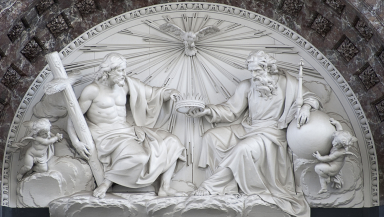
A recent study of American adults by the Cultural Research Centre at Arizona Christian University revealed a startling truth: that only 11% Americans overall and just 16% of self-identified Christians believe in the Trinity.
This is deeply concerning because the Trinity is not some optional or secondary belief in Christianity; it's foundational. To reject the Trinity is, in essence, to reject the core of the Christian faith itself.
So, why do so many reject it? More often than not, it is not down to rebellion, but rather a misunderstanding.
And that’s exactly what this article hopes to clear up. While I’m not a theologian, I want to offer a simple yet meaningful explanation of the Trinity and why it’s so vital in Christianity.
What Is the Trinity?
The word “Trinity” doesn’t actually appear in the Bible. It was first introduced by Tertullian, an early Christian apologist in the 2nd century, and was later formalised at the Council of Nicaea in 325 AD.
In the simplest terms, the Trinity describes God as one Being who exists as three distinct but equal Persons - God the Father, God the Son (Jesus Christ), and God the Holy Spirit.
This isn’t three gods. It’s one triune God.
Where do we see the Trinity in the Bible?
The Trinity has existed from the very beginning. In fact, we catch a glimpse of the Trinity right in the first three verses of Genesis 1. God the Father speaks the Word, which is God the Son (John 1:1), that actively brings creation into existence; and God the Spirit is also present hovering – nurturing and preparing life on the formless and empty Earth.
Even though the term itself isn’t used in Scripture; the concept is woven all throughout the Bible. For example, it is evident in Matthew 3:16-17, Matthew 28:18-20 and 2 Corinthians 13:14.
Why is the Trinity so important?
Through the Trinity, we gain a clearer understanding of who God is, how He works, and how we, as Christians, can relate to Him in our daily lives. More specifically, it deepens our grasp of His love and the salvation He offers.
1. It reveals God’s loving relational nature
Because God is love (1 John 4:8), He has existed eternally as a relationship - Father, Son, and Spirit - bound by perfect love. Love didn’t begin with creation. It has always existed within God Himself. And because true love naturally overflows, God created us out of love, for love, and to live in relationship with Him.
2. It explains salvation
Yet, through Satan’s deception, sin entered the world, and humanity fell away from God's perfect design, choosing separation over communion with Him (Genesis 3).
Because God is love, He could not stand by and watch humanity perish eternally. Yet, God the Father, in His holiness and transcendence (1 Peter 1:15-16), cannot dwell in perfect relationship with sinful humanity as we are.
So, out of mercy and love, He sent God the Son - the Word who took on flesh - to reveal His heart, restore what was broken, and rescue us from eternal separation (John 3:16).
Through Jesus, we are offered the gift of salvation and drawn back into union with God (Romans 5:10).
3. It clarifies who Jesus really is
This is why Jesus is at the very centre of the Christian faith. He is not merely a prophet or respected teacher, He is God the Son – fully God and fully human (Colossians 2:9), sent by God the Father.
This divine identity is why He alone could be the perfect, sinless sacrifice for our sins (1 Peter 1:18-19). It’s why He has the authority to forgive sin, perform miracles, rise from the dead and to command nature itself (Mark 2:10; Luke 8:24-25 and John 10:17-18) - because He is the very Word of God through whom all things were made (John 1:1-3).
In Jesus, God stepped down from Heaven, not just to teach or inspire, but to rescue us with His own life (Philippians 2:6-8).
4. It makes the Christian life possible
For this same reason, the Holy Spirit plays a vital role in the Christian faith.
God the Spirit, also known as the Spirit of truth and life (John 14:17 and Romans 8:2), is not distant or abstract - He is God's presence within us (1 Corinthians 3:16). Just as our physical bodies are lifeless without oxygen, our spiritual bodies are spiritually dead without the Holy Spirit.
He reveals to us the depth of God the Father’s unconditional love, as demonstrated through God the Son (Romans 5:5). He lives within every believer - empowering, convicting, guiding, comforting, interceding, and advocating on our behalf (John 14:26; Romans 8:26 and Acts 1:18).
Through Him, we are born again and identified as children of God (John 3:5-6 and Romans 8:14-16), just as earthly children are known by their parents through shared blood and resemblance. He connects us to the Father and the Son, making our relationship with God personal and real.
Each Person of the Trinity works in harmony to redeem and restore us.
The mystery of the Trinity and why it matters to you
Admittedly, the Trinity is a hard concept to grasp. It is one of the most profound and challenging doctrines in the Christian faith. It stretches beyond human understanding, and we may never fully grasp why God chose to exist and reveal Himself in this triune way. Yet, this mystery is part of what makes God divine and infinite.
What matters most is this: we need the Trinity to truly know who God is, to receive His gift of salvation, and to live in a loving, eternal relationship with Him.
The Trinity is not just theology - it’s intimacy. It’s God’s gift to us: an invitation to be part of a divine love that existed before time began, and that stretches into eternity.
The Trinity is the heart of Christianity.













